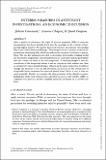| dc.description.abstract | After a period of dormancy, the topic of interim measures (IMs) in antitrust investigations has been brought back into the spotlight in the context of fast moving digital markets. We analyze historical practices and criteria surrounding IMs in the United States and Europe. Then we present an economic model of the parameters underlying IMs, which can inform the decision of whether to pursue them. The two key parameters needed to determine the benefits of taking an IM are the relative magnitudes of irreparable harm to each party and the probability that the conduct is found to be anticompetitive. A resulting insight is that the overall size of the irreparable harms is not as relevant as their relative size (that is, asymmetry). Increasing both types of harm in the same proportion would not change the decision to use an IM. However, an increase in the overall size of irreparable harms increases the expected benefit from IMs as a tool, if they are used optimally. Finally, we examine the characteristics of the digital economy, finding that while such characteristics are likely to increase the benefits of IMs as a general tool, there is a need to carefully assess IM decisions on a case-by-case basis. | en_US |
